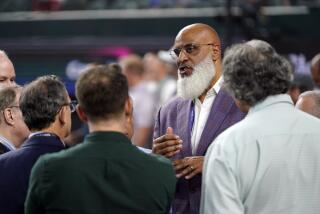They Get Together, but Not on Issues : Baseball: Players and owners finally talk, but no progress is reported in settling strike.
- Share via
NEW YORK — Players and owners went eye to eye for the first time in baseball’s stalemated collective bargaining talks Wednesday, but there was still no indication they are seeing eye to eye.
There was no progress and no change of position on Day 13 of the players strike.
The talks, however, will resume this morning under the auspices of federal mediators, and both sides seemed to feel that an improved tone was established during a seven-hour meeting in which 12 owners and club executives expressed their need for a new compensation system and five of the 21 players in attendance--Paul Molitor, Brett Butler, Curt Schilling, Kevin Brown and Scott Sanderson--explained their opposition to a salary cap.
Said Molitor later: “The owners made some heartfelt and emotional presentations about the economic concerns they feel need to be addressed, but the players said, ‘Yes, we know some teams are being squeezed, but we don’t think this proposal solves the problems.’
“We told them they were asking the players to solve problems (through the cap) that they should solve themselves (through increased revenue sharing not linked to a cap). There will be no baseball as long as the cap is on the table.”
Billed as the first negotiating session since the strike began on Aug. 12, there was no real negotiation, only statements of policy, position and historical perspective. Donald Fehr, executive director of the Major League Players Assn., is said to have spoken for almost two hours about previous negotiations--this is the eighth stoppage since 1972--and the players’ long fight to win rights and freedom threatened by a proposal that would destroy free agency and put artificial restraints on a free market.
“This was the kind of meeting that you might expect at the preliminary stage of bargaining, several weeks, if not more than that, before a strike deadline, not 12 days into a strike,” Fehr said at a news conference, adding that it probably should have been held even before the owners reopened the negotiations a year early, in December of 1992, and certainly before they made their proposal on May 23 of this year.
“It’s still shaping up as a very long process,” Fehr said. “There is no indication the owners want a quick resolution.”
Owners negotiator Richard Ravitch agreed in part, saying there will be no progress until the players address the owners’ need for cost certainty and the relationship between revenue and compensation. He described the meeting--interrupted several times when the teams separated to caucus or confer with the mediators--as civil and intelligent, but said it did not address those central issues.
“Hopefully, that will happen tomorrow, but I don’t think you can expect any instant changes,” Ravitch said. Nevertheless, some players came away with a feeling that the owners have begun to show some flexibility regarding the cap.
Said Butler, the Dodgers’ assistant player representative: “I didn’t get the feeling from them that they were saying, ‘This is the way it’s got to be,’ and that’s an improvement. I mean, there were some voices raised, and frustration expressed, but I thought it was positive and constructive. After 14 years (of his involvement in labor issues), it was refreshing to have 12 representatives of the owners across the table.”
If that feeling of flexibility is legitimate, it may stem from what seems to be a conscious attempt by the owners to avoid reference to a salary cap per se, and to draw the union out regarding alternative proposals.
Did all 12 owners and executives refer specifically to a cap during their presentations Wednesday?
“Some did and some didn’t,” said Gene Orza, the union’s associate general counsel. “Maybe that’s a good sign.”
Boston Red Sox CEO John Harrington said the ability to project labor costs by a pre-established link between revenue and compensation “doesn’t have to come through a salary cap.” He said there are alternatives based on tax plans and salary scales among other things, and that the owners continue to hope the union will address those.
Alternatives? “A rose by any other name is still a rose,” Fehr said, adding that when the union offered alternatives devoid of a cap or a defined percentage of revenue going to salaries, they were quickly rejected by the owners. “Our position has always been that the free market should establish what the players receive,” he said. “If salaries decrease in a free market, so be it. The players are prepared to live with that.”
John Calhoun Wells, national director of the Federal Mediation and Conciliation Service, commended the owners and players on their “professional and problem solving” deportment as talks resumed, but where it leads is still uncertain.
More to Read
Are you a true-blue fan?
Get our Dodgers Dugout newsletter for insights, news and much more.
You may occasionally receive promotional content from the Los Angeles Times.







